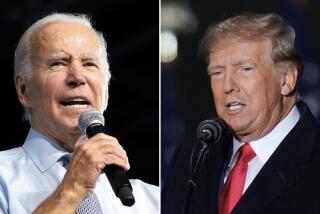Bread-and-Butter Ballots
- Share via
The midterm elections of 1962 were held just a few weeks after the fateful 13 days of the Cuban missile crisis. Contemporary accounts pronounced President Kennedy’s handling of this brush with nuclear war to have been masterful.
The “eyeball-to-eyeball” confrontation between Kennedy and Nikita Khrushchev resulted in the removal of Soviet missiles from Cuba.
Political logic might dictate that scores of Democratic congressional candidates would romp to victory. Yet Kennedy’s party lost four seats in the House and picked up three in the Senate.
It was a wash.
And that’s probably what Republicans can expect from the current showdown with Iraq.
To be sure, some GOP congressional candidates have tagged their Democratic opponents as nervous Nellies who have gone wobbly at the prospect of going to war to disarm Saddam Hussein. This was the cause of Senate Majority Leader Tom Daschle’s indignant response to President Bush on the floor of the Senate on Wednesday.
But if all Republicans have to offer the voters is a more truculent line toward Iraq, and they present no other compelling reason to choose them, they will end up the losers.
Few midterm elections have yielded dramatic setbacks to the party of the president, and when they do, the causes usually have little to do with war and peace.
The Democratic loss of Congress in 1946 had more to do with the problems of reconversion to a civilian economy after World War II than it did with the war itself, or even with the emerging Cold War.
The 1958 election, in which President Eisenhower’s Republicans took a 48-seat hit in the House and suffered the loss of 13 senators, was due almost exclusively to the economy.
The falloff of 47 Democratic House seats in the 1966 election had more to do with the large number of Democrats elected on Lyndon Johnson’s coattails in 1964 in districts that were solidly Republican.
The 1974 election was all about Watergate and the pardoning of former President Nixon by his successor, and the GOP loss of 26 House seats in 1982 was the product of a national unemployment rate that had soared to more than 10% under President Reagan.
Even the spectacular blowout of Democrats in 1994 by the Republicans led by then-Rep. Newt Gingrich of Georgia was a repudiation of President Clinton’s domestic policies.
Of those midterm elections conducted in wartime, the impact of the hostilities is unclear.
The 1950 election, conducted five months after the start of the Korean War, saw President Truman’s Democrats losing 29 seats in the House and six in the Senate, a fairly substantial loss.
But in the 1970 election in the midst of the Vietnam War, Nixon’s GOP House contingent was reduced by only 12 members, and he picked up two seats in the Senate.
What drives congressional elections are three factors that are remarkably durable.
The first is the partisanship of the voters. With so many House seats sewn up by one party or the other because of gerrymandering, the opportunity for many seats to change hands is limited.
The second factor is the quality of the candidates, often defined as how much money a candidate can raise.
Finally, there are the issues.
It is here where we would expect anxieties over Iraq to have their greatest impact, but most candidates will be able to position themselves to take advantage of the pulse of the public in their states and districts.
For example, a group of 18 liberal Democrats held a rally in Washington last week to deplore not war itself but rather the president’s haste to go to war. Their caution reflects the hesitancy of their constituents, and they are not likely to suffer for it.
Two decades ago, House Speaker Tip O’Neill laid down the axiom that all politics is local. The issues closest to home--the economy and jobs, health insurance and prescriptions for the elderly--will influence more voters than the stand any one member of Congress takes on regime change in Iraq.
More to Read
Get the L.A. Times Politics newsletter
Deeply reported insights into legislation, politics and policy from Sacramento, Washington and beyond. In your inbox twice per week.
You may occasionally receive promotional content from the Los Angeles Times.










